浙江省2013届高考英语:完形填空之记叙文解析(02)
文档属性
| 名称 | 浙江省2013届高考英语:完形填空之记叙文解析(02) |
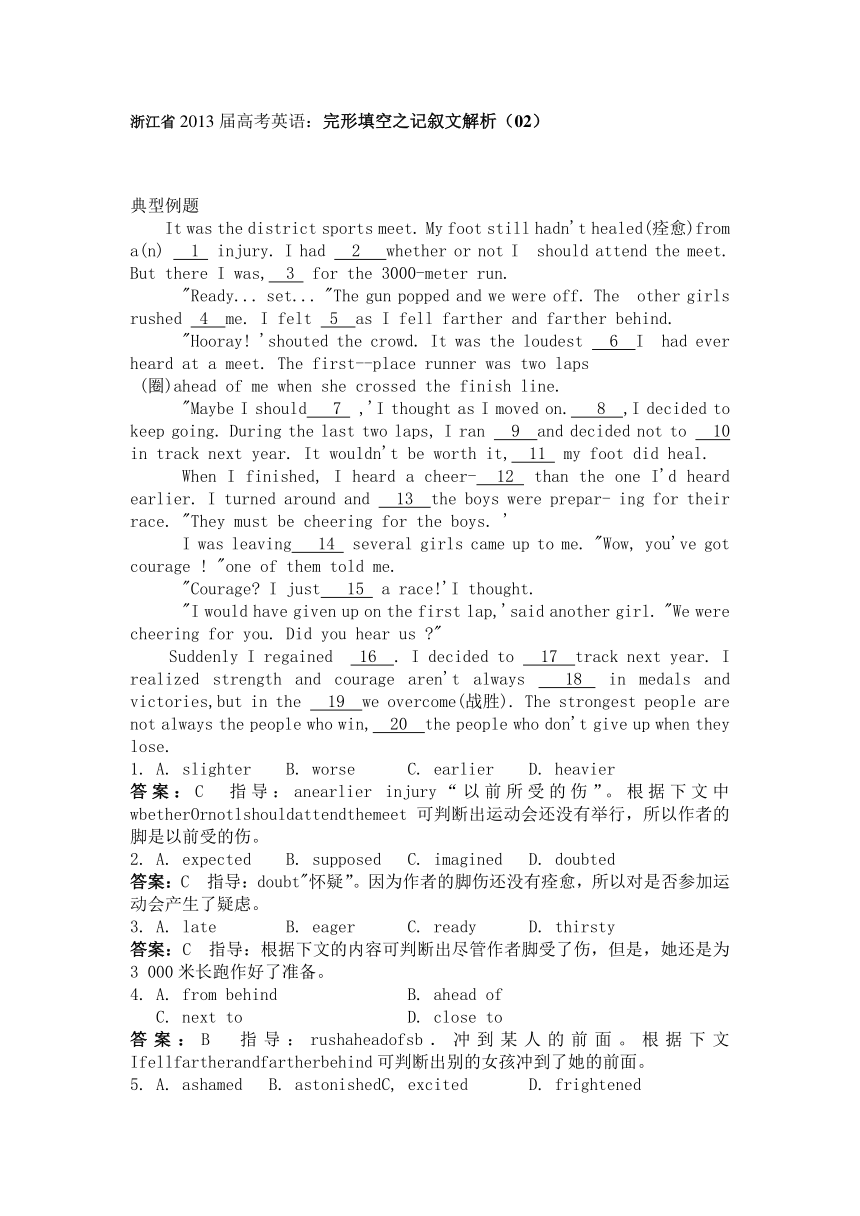
|
|
| 格式 | zip | ||
| 文件大小 | 22.1KB | ||
| 资源类型 | 教案 | ||
| 版本资源 | 通用版 | ||
| 科目 | 英语 | ||
| 更新时间 | 2012-11-02 00:00:00 | ||
图片预览

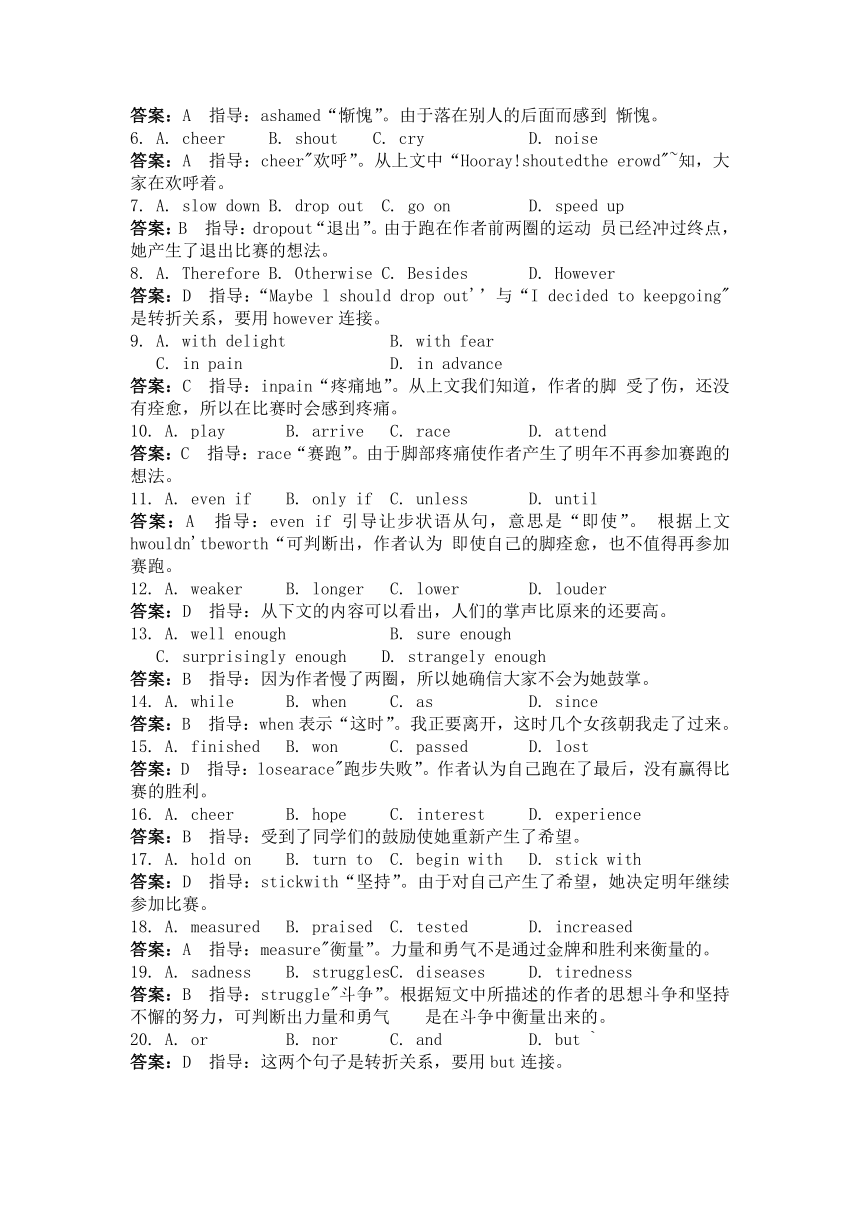
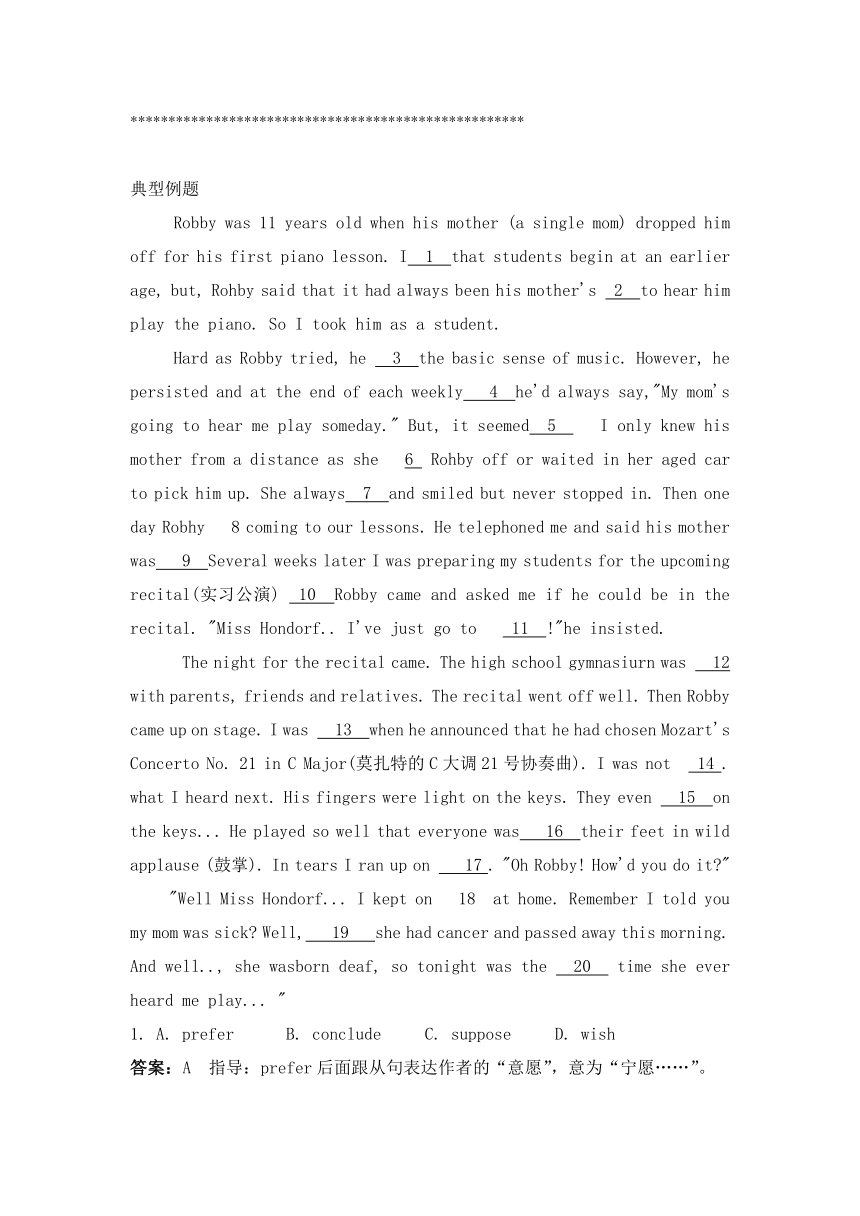
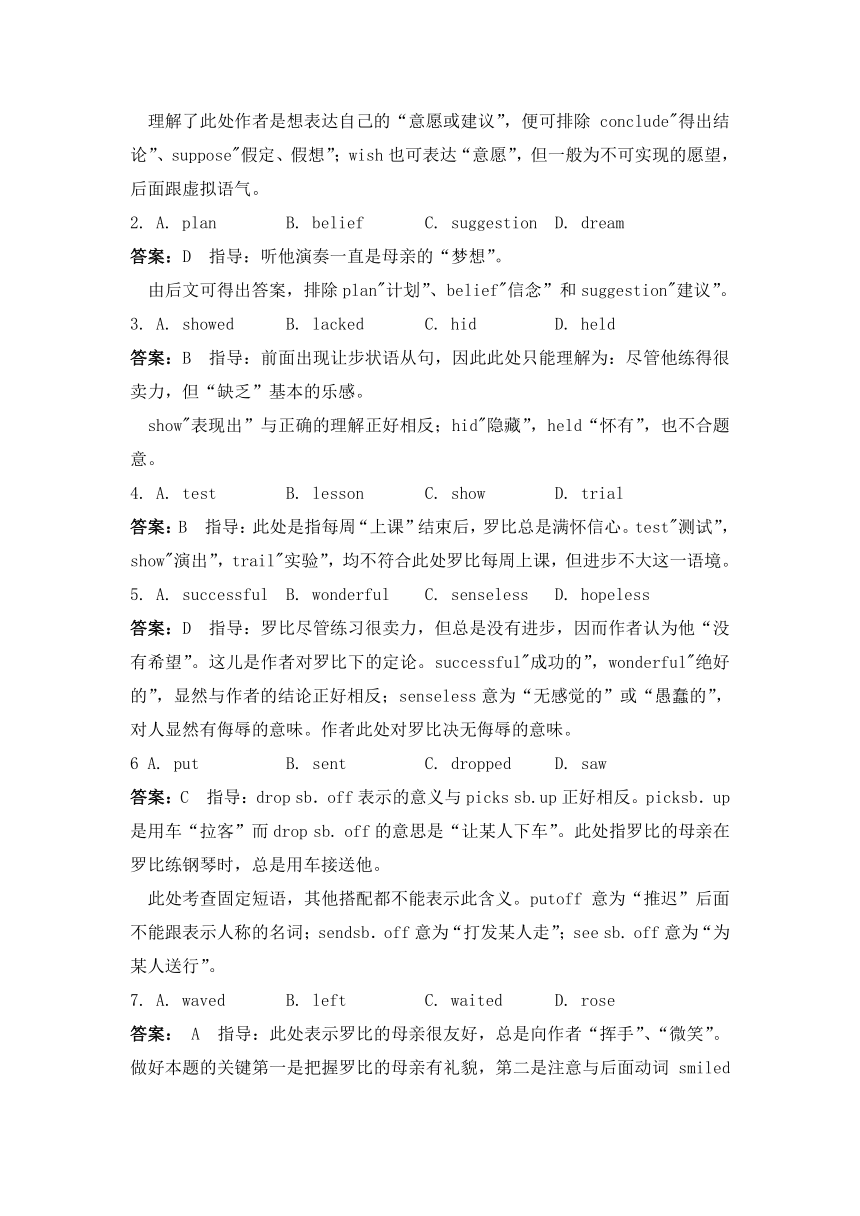
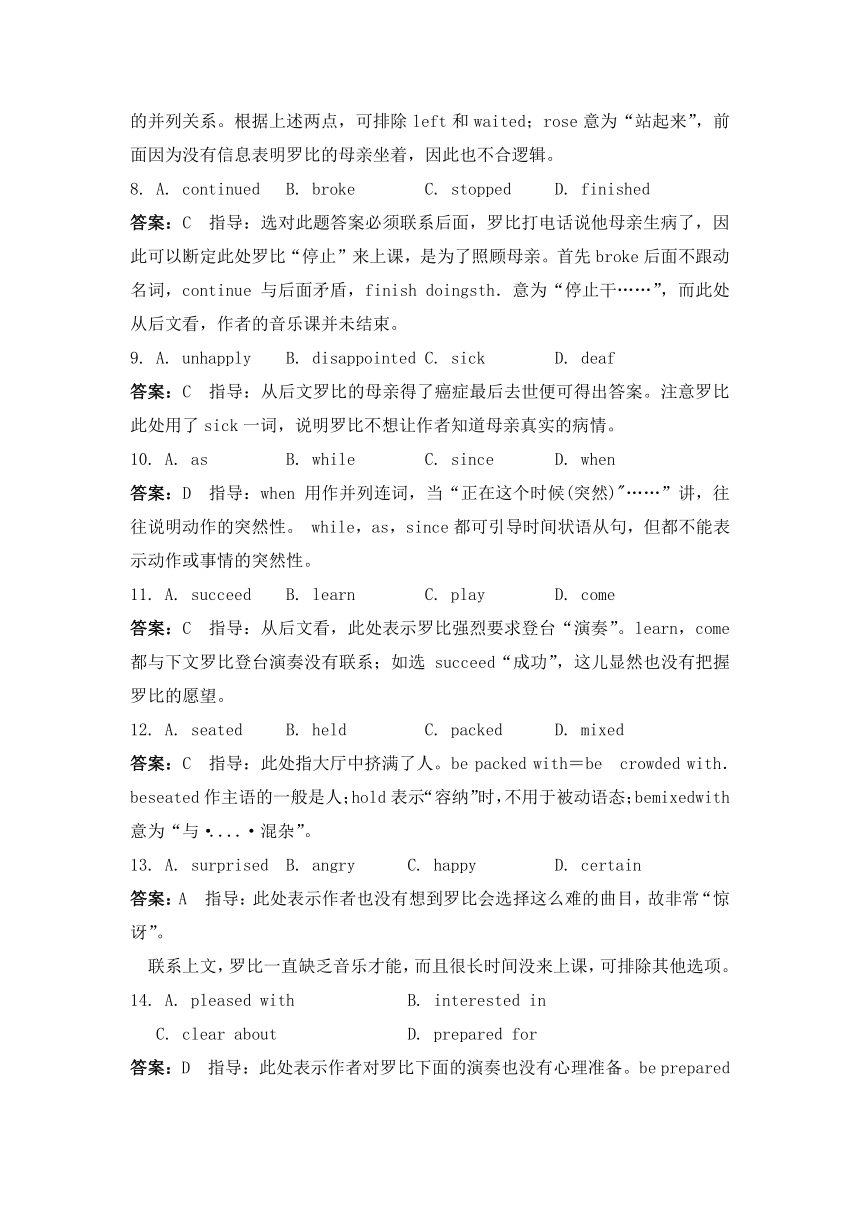
文档简介
浙江省2013届高考英语:完形填空之记叙文解析(02)
典型例题
It was the district sports meet. My foot still hadn't healed(痊愈)from a(n) 1 injury. I had 2 whether or not I should attend the meet. But there I was, 3 for the 3000-meter run.
"Ready... set... "The gun popped and we were off. The other girls rushed 4 me. I felt 5 as I fell farther and farther behind.
"Hooray! 'shouted the crowd. It was the loudest 6 I had ever heard at a meet. The first--place runner was two laps
(圈)ahead of me when she crossed the finish line.
"Maybe I should 7 ,'I thought as I moved on. 8 ,I decided to keep going. During the last two laps, I ran 9 and decided not to 10 in track next year. It wouldn't be worth it, 11 my foot did heal.
When I finished, I heard a cheer- 12 than the one I'd heard earlier. I turned around and 13 the boys were prepar- ing for their race. "They must be cheering for the boys. '
I was leaving 14 several girls came up to me. "Wow, you've got courage ! "one of them told me.
"Courage? I just 15 a race!'I thought.
"I would have given up on the first lap,'said another girl. "We were cheering for you. Did you hear us ?"
Suddenly I regained 16 . I decided to 17 track next year. I realized strength and courage aren't always 18 in medals and victories,but in the 19 we overcome(战胜). The strongest people are not always the people who win, 20 the people who don't give up when they lose.
1. A. slighter B. worse C. earlier D. heavier
答案:C 指导:anearlier injury“以前所受的伤”。根据下文中wbetherOrnotlshouldattendthemeet可判断出运动会还没有举行,所以作者的脚是以前受的伤。
2. A. expected B. supposed C. imagined D. doubted
答案:C 指导:doubt"怀疑”。因为作者的脚伤还没有痊愈,所以对是否参加运动会产生了疑虑。
3. A. late B. eager C. ready D. thirsty
答案:C 指导:根据下文的内容可判断出尽管作者脚受了伤,但是,她还是为3 000米长跑作好了准备。
4. A. from behind B. ahead of
C. next to D. close to
答案:B 指导:rushaheadofsb.冲到某人的前面。根据下文Ifellfartherandfartherbehind可判断出别的女孩冲到了她的前面。
5. A. ashamed B. astonishedC, excited D. frightened
答案:A 指导:ashamed“惭愧”。由于落在别人的后面而感到 惭愧。
6. A. cheer B. shout C. cry D. noise
答案:A 指导:cheer"欢呼”。从上文中“Hooray!shoutedthe erowd"~知,大家在欢呼着。
7. A. slow down B. drop out C. go on D. speed up
答案:B 指导:dropout“退出”。由于跑在作者前两圈的运动 员已经冲过终点,她产生了退出比赛的想法。
8. A. Therefore B. Otherwise C. Besides D. However
答案:D 指导:“Maybe l should drop out'’与“I decided to keepgoing"是转折关系,要用however连接。
9. A. with delight B. with fear
C. in pain D. in advance
答案:C 指导:inpain“疼痛地”。从上文我们知道,作者的脚 受了伤,还没有痊愈,所以在比赛时会感到疼痛。
10. A. play B. arrive C. race D. attend
答案:C 指导:race“赛跑”。由于脚部疼痛使作者产生了明年不再参加赛跑的想法。
11. A. even if B. only if C. unless D. until
答案:A 指导:even if 引导让步状语从句,意思是“即使”。 根据上文hwouldn'tbeworth“可判断出,作者认为 即使自己的脚痊愈,也不值得再参加赛跑。
12. A. weaker B. longer C. lower D. louder
答案:D 指导:从下文的内容可以看出,人们的掌声比原来的还要高。
13. A. well enough B. sure enough
C. surprisingly enough D. strangely enough
答案:B 指导:因为作者慢了两圈,所以她确信大家不会为她鼓掌。
14. A. while B. when C. as D. since
答案:B 指导:when表示“这时”。我正要离开,这时几个女孩朝我走了过来。
15. A. finished B. won C. passed D. lost
答案:D 指导:losearace"跑步失败”。作者认为自己跑在了最后,没有赢得比赛的胜利。
16. A. cheer B. hope C. interest D. experience
答案:B 指导:受到了同学们的鼓励使她重新产生了希望。
17. A. hold on B. turn to C. begin with D. stick with
答案:D 指导:stickwith“坚持”。由于对自己产生了希望,她决定明年继续参加比赛。
18. A. measured B. praised C. tested D. increased
答案:A 指导:measure"衡量”。力量和勇气不是通过金牌和胜利来衡量的。
19. A. sadness B. strugglesC. diseases D. tiredness
答案:B 指导:struggle"斗争”。根据短文中所描述的作者的思想斗争和坚持不懈的努力,可判断出力量和勇气 是在斗争中衡量出来的。
20. A. or B. nor C. and D. but `
答案:D 指导:这两个句子是转折关系,要用but连接。
****************************************************
典型例题
Robby was 11 years old when his mother (a single mom) dropped him off for his first piano lesson. I 1 that students begin at an earlier age, but, Rohby said that it had always been his mother's 2 to hear him play the piano. So I took him as a student.
Hard as Robby tried, he 3 the basic sense of music. However, he persisted and at the end of each weekly 4 he'd always say,"My mom's going to hear me play someday." But, it seemed 5 I only knew his mother from a distance as she 6 Rohby off or waited in her aged car to pick him up. She always 7 and smiled but never stopped in. Then one day Robhy 8 coming to our lessons. He telephoned me and said his mother was 9 Several weeks later I was preparing my students for the upcoming recital(实习公演) 10 Robby came and asked me if he could be in the recital. "Miss Hondorf.. I've just go to 11 !"he insisted.
The night for the recital came. The high school gymnasiurn was 12 with parents, friends and relatives. The recital went off well. Then Robby came up on stage. I was 13 when he announced that he had chosen Mozart's Concerto No. 21 in C Major(莫扎特的C大调21号协奏曲). I was not 14 . what I heard next. His fingers were light on the keys. They even 15 on the keys... He played so well that everyone was 16 their feet in wild applause (鼓掌). In tears I ran up on 17 . "Oh Robby! How'd you do it?"
"Well Miss Hondorf... I kept on 18 at home. Remember I told you my mom was sick? Well, 19 she had cancer and passed away this morning. And well.., she wasborn deaf, so tonight was the 20 time she ever heard me play... "
1. A. prefer B. conclude C. suppose D. wish
答案:A 指导:prefer后面跟从句表达作者的“意愿”,意为“宁愿……”。
理解了此处作者是想表达自己的“意愿或建议”,便可排除conclude"得出结论”、suppose"假定、假想”;wish也可表达“意愿”,但一般为不可实现的愿望,后面跟虚拟语气。
2. A. plan B. belief C. suggestion D. dream
答案:D 指导:听他演奏一直是母亲的“梦想”。
由后文可得出答案,排除plan"计划”、belief"信念”和suggestion"建议”。
3. A. showed B. lacked C. hid D. held
答案:B 指导:前面出现让步状语从句,因此此处只能理解为:尽管他练得很卖力,但“缺乏”基本的乐感。
show"表现出”与正确的理解正好相反;hid"隐藏”,held“怀有”,也不合题意。
4. A. test B. lesson C. show D. trial
答案:B 指导:此处是指每周“上课”结束后,罗比总是满怀信心。test"测试”,show"演出”,trail"实验”,均不符合此处罗比每周上课,但进步不大这一语境。
5. A. successful B. wonderful C. senseless D. hopeless
答案:D 指导:罗比尽管练习很卖力,但总是没有进步,因而作者认为他“没有希望”。这儿是作者对罗比下的定论。successful"成功的”,wonderful"绝好的”,显然与作者的结论正好相反;senseless意为“无感觉的”或“愚蠢的”,对人显然有侮辱的意味。作者此处对罗比决无侮辱的意味。
6 A. put B. sent C. dropped D. saw
答案:C 指导:drop sb.off表示的意义与picks sb.up正好相反。picksb.up是用车“拉客”而drop sb. off的意思是“让某人下车”。此处指罗比的母亲在罗比练钢琴时,总是用车接送他。
此处考查固定短语,其他搭配都不能表示此含义。putoff意为“推迟”后面不能跟表示人称的名词;sendsb.off意为“打发某人走”;see sb. off意为“为某人送行”。
7. A. waved B. left C. waited D. rose
答案: A 指导:此处表示罗比的母亲很友好,总是向作者“挥手”、“微笑”。做好本题的关键第一是把握罗比的母亲有礼貌,第二是注意与后面动词smiled的并列关系。根据上述两点,可排除left和waited;rose意为“站起来”,前面因为没有信息表明罗比的母亲坐着,因此也不合逻辑。
8. A. continued B. broke C. stopped D. finished
答案:C 指导:选对此题答案必须联系后面,罗比打电话说他母亲生病了,因此可以断定此处罗比“停止”来上课,是为了照顾母亲。首先broke后面不跟动名词,continue与后面矛盾,finish doingsth.意为“停止干……”,而此处从后文看,作者的音乐课并未结束。
9. A. unhapply B. disappointed C. sick D. deaf
答案:C 指导:从后文罗比的母亲得了癌症最后去世便可得出答案。注意罗比此处用了sick一词,说明罗比不想让作者知道母亲真实的病情。
10. A. as B. while C. since D. when
答案:D 指导:when用作并列连词,当“正在这个时候(突然)"……”讲,往往说明动作的突然性。 while,as,since都可引导时间状语从句,但都不能表示动作或事情的突然性。
11. A. succeed B. learn C. play D. come
答案:C 指导:从后文看,此处表示罗比强烈要求登台“演奏”。learn,come都与下文罗比登台演奏没有联系;如选succeed“成功”,这儿显然也没有把握罗比的愿望。
12. A. seated B. held C. packed D. mixed
答案:C 指导:此处指大厅中挤满了人。be packed with=be crowded with.
beseated作主语的一般是人;hold表示“容纳”时,不用于被动语态;bemixedwith意为“与·....·混杂”。
13. A. surprised B. angry C. happy D. certain
答案:A 指导:此处表示作者也没有想到罗比会选择这么难的曲目,故非常“惊讶”。
联系上文,罗比一直缺乏音乐才能,而且很长时间没来上课,可排除其他选项。
14. A. pleased with B. interested in
C. clear about D. prepared for
答案:D 指导:此处表示作者对罗比下面的演奏也没有心理准备。be prepared for意为“为……做好准备”。此处还是表示作者的“吃惊”,因此可排除其他三项:be pleasedwith"对……满意”;be interested in"对……感兴趣”;bedearabout"对……很清楚”。
15. A. slipped B. danced C. flew D. ran
答案:B 指导:此处表示罗比演奏得非常熟练、精彩,手指在琴键上像“跳舞”一般。slip意为“滑倒”;flow意为“流动、飞奔”;run"跑”,都不能形容罗比弹钢琴时手指的熟练。
16. A. off B. at C. against D. on
答案:D 指导:be。none'sfeet意为“站起来”,此处观众都站起来为罗比的精彩演奏鼓掌。
17. A. stairs B. platform C. stage D. floor
答案:C 指导:作者本人也很激动,因此跑上了“舞台”。此处罗比演奏完毕仍在舞台上,由此可排除其他选项:
stairs意为“楼梯”;platform意为“站台、讲台”;floor意为“地板”。
18. A. practising B. singing C. listening D. helping
答案:A 指导:罗比虽然中断了钢琴课的学习,在家照料母亲,但一直在“练习”弹钢琴,因此才有今天的成功。
19. A. unfortunately B. therefore
C. however D. actually
答案:D 指导:此处罗比说明母亲生病去世的真相,因此用actually,相当于infact.therefore"所以”,however"然而”,都不符合此处上下文的逻辑关系;unfortunatel/‘不幸的是”,干扰性很大。但前面出现的是问句,用于引出对真相的叙述,故unfortuanately也不能顺承上文。
20. A. last B first C. best D. worst
答案:B 指导:从前文可知,罗比的母亲耳聋,因此不能听他演奏,罗比认为只有她去世后才能在天堂听他演奏,故应是“第一次”。把握了上文的叙述,再联系罗比的愿望和心理,此处其他选项便不难排除。
********************************************************
典型例题
Coming home from school that dark winter day so long ago, I was filled with excitement of having the weekend off. But 1 was 1 into stillness by what I saw. Mother, seated at the far end of the sofa, 2 , with the second-hand green typewriter on tile table. She told me that she couldn't type fast and then she was out of work. My shock and embarrassment (尴尬)at finding Mother in tears was a perfect proof of how 3 understood the pressures on her. Sitting beside her on the sofa, I began very 4 to understand. "I guess we all have to 5 sometime, "Mother said quietly. I could 6_ her pain ami Iht, tension (压力)of 7 tilt' strong feelings that were in terrupted by my arrival. Suddenly, something inside mt' 8 I reached out and put my arms around her. She I)roke then. Silt' lint her face 9 ray shotulder and sobbed. I held her 10 and didn't try to talk. I knew I was doing what I 11 ,what ] could anti that it was enough. In that moment, Let'ling Mother's 12 with feelings, I tmderst(x)(I for the first tinte her being so easy to 13 . She was still my moth er, 14 she was something 15 a person like me, capal)le of fear and 16 and failure. I could feel her pain as she must have feh nfine on a thousand occasions (场合)when I sought 17 in her arms.
A week later Mother took a job selling dry goods at half the salary the radiostation 18 . "It's a job 1 can do, though. "She said simply. But the evening practice on the old green typewriter continued. 1 had a very 19 feeling now when I passed her door at night and heard her 20 away across the paper. I knew there was something more going on in there than a woman learning to type.
1. A. tired B. ashamed C. lazy D. shocked
答案:D 指导:看到母亲伤心的样子,作者感到“震惊”,后面有提示。
2. A. crying B. smiling C. thinking D. whispering
答案:A 指导:由后文得知,母亲在“哭”,intears可作为信息提示。
3. A. eagerly B. worriedly C. litth, D. nmch
答案:C 指导:由前文的“震惊”和“尴尬”可知,作者对母亲承受的压力所知甚少。“急切地”“担心地”都不适合与动词“理解”搭配;much表达的意义正好相反.
4. A. quickly B. slowly C. suddenly D. proudly
答案:B 指导:因为作者对母亲承受的压力所知甚少,所以此处应是“慢慢地”明白母亲的处境。quickly"'陕速地”表示动作迅速;suddenly说明动作、情况等出乎意料;proudly"自豪地”显然不合题意。
5. A. fail B. win C. fall sick D. give in
答案:A 指导:这是母亲自我安慰的话:人人都会失败。理解了文章母亲因为事业而伤心,而此处在自我安慰,就会排除“成功…“病倒”“屈服”。
6. A. learn B. watch C. sense D. recognize
C 指导:此处强调作者的“感觉”,sense用作动词,当“感觉到”讲。learn''获悉、获知”;watch"注视”;recognize"辨认,分辨”都不合题意。
7. A. holding back B. putting away
C. sitting up D. stopping from
答案:A 指导:看到作者来到,母亲“忍住”悲伤,holdback"阻止”“忍住”,符合题意。put away"收起来,放起来,储存”,不合题意。
8. A. lit up B. came true C. turned D. increased
答案:C 指导:此处指我内心的某种感情发生了“转变”,故用turn.1ightup"照亮”;cometrue"梦想等实现”;increase"数量等增加”都不合题意。
9. A. to B. up C. through D. against
答案:D 指导:介词against当“依靠”讲,此处指母亲把头靠在我的肩膀上。
10. A. tightly B. thoughtfully
C. carefully D. politely
答案:A 指导:作者“紧紧地”抱住母亲,以示对她的安慰。此处仅仅说明动作,“体贴到”“细心地…‘有礼貌地”修饰“拥抱”都不恰当。
11. A. should B. would C. could D. might
答案:A 指导:此处表示作者意识到母亲作为一个平常人的脆弱,“应该”给她以安慰。其他情态动词不合题意。
12. A. hand B. face C. hair D. back
答案:D 指导:此处作者满怀感情地“抚摩”母亲的背,也是对母亲的理解和安慰。由作者前面“拥抱着”母亲可排除其他选项。
13. A. content B. break C. fall D. understand
答案:B 指导:看到母亲如此伤心,作者体会到母亲原来也是这么容易“沮丧、崩溃”。break当“沮丧、崩溃”讲。content
“满意的”,fall"摔倒”,都不合题意。
14. A. therefore B. however C. yet D. though
答案:C 指导:yet用作副词,表转折,意为“然而”。therefore"所以…‘though"当副词用时,也可以当“然而”讲,但往往用于句末,且前面用逗号隔开;however表转折时,往往需要逗号把前后文隔开。
15. A. more B. much C. little D. huge
答案:A 指导:作者认识到自己的母亲不仅仅是“母亲”,还是一个平常人,more"另外的”,符合题意。此处具有比较意义,故排除其他选项。
16. A. wound B. defeat C. cut D. hurt
答案:D 指导:hurt与前面的fear和后面的failure构成并列关系,此处指“内心感情”的伤害,故用hurt.wound多指对身体的伤害;defeat"打败”,不符合语境。
17. A. kindness B. memory C. comfort D. support
答案:C 指导:一般情况下,孩子应在母亲那儿寻求“安慰”,而此时作者认识到,母亲也需要子女的安慰。由语境可排除其他选项,母亲伤心时需要的是“安慰”,而不是别人的“善良”和“支持”。
18. A. supplied B. offered
C. paid D. contributed
答案:B 指导:offer当“提供”讲。此处指母亲拿电台出的一半的工资卖东西。supply,pay,contribute都不能直接与前面的salary搭配。
19. A. different B. hard C. pleasant D. serious
答案:A 指导:有了以上对母亲的了解,作者因此对母亲有了“不同”的感情。此处说明作者内心情感的变化,因此不用“困难的”“愉快的”和“严肃的”。
20. A. hitting B. tapping C. beating D. striking
答案:B 指导:tap意为“轻敲”,此处指打字,因此不用其他几个动词。由特定的语境可排除其他选项:hit"击打”;beat连续地“敲打;击打”;strike"打击”。
*******************************************************结束
典型例题
It was the district sports meet. My foot still hadn't healed(痊愈)from a(n) 1 injury. I had 2 whether or not I should attend the meet. But there I was, 3 for the 3000-meter run.
"Ready... set... "The gun popped and we were off. The other girls rushed 4 me. I felt 5 as I fell farther and farther behind.
"Hooray! 'shouted the crowd. It was the loudest 6 I had ever heard at a meet. The first--place runner was two laps
(圈)ahead of me when she crossed the finish line.
"Maybe I should 7 ,'I thought as I moved on. 8 ,I decided to keep going. During the last two laps, I ran 9 and decided not to 10 in track next year. It wouldn't be worth it, 11 my foot did heal.
When I finished, I heard a cheer- 12 than the one I'd heard earlier. I turned around and 13 the boys were prepar- ing for their race. "They must be cheering for the boys. '
I was leaving 14 several girls came up to me. "Wow, you've got courage ! "one of them told me.
"Courage? I just 15 a race!'I thought.
"I would have given up on the first lap,'said another girl. "We were cheering for you. Did you hear us ?"
Suddenly I regained 16 . I decided to 17 track next year. I realized strength and courage aren't always 18 in medals and victories,but in the 19 we overcome(战胜). The strongest people are not always the people who win, 20 the people who don't give up when they lose.
1. A. slighter B. worse C. earlier D. heavier
答案:C 指导:anearlier injury“以前所受的伤”。根据下文中wbetherOrnotlshouldattendthemeet可判断出运动会还没有举行,所以作者的脚是以前受的伤。
2. A. expected B. supposed C. imagined D. doubted
答案:C 指导:doubt"怀疑”。因为作者的脚伤还没有痊愈,所以对是否参加运动会产生了疑虑。
3. A. late B. eager C. ready D. thirsty
答案:C 指导:根据下文的内容可判断出尽管作者脚受了伤,但是,她还是为3 000米长跑作好了准备。
4. A. from behind B. ahead of
C. next to D. close to
答案:B 指导:rushaheadofsb.冲到某人的前面。根据下文Ifellfartherandfartherbehind可判断出别的女孩冲到了她的前面。
5. A. ashamed B. astonishedC, excited D. frightened
答案:A 指导:ashamed“惭愧”。由于落在别人的后面而感到 惭愧。
6. A. cheer B. shout C. cry D. noise
答案:A 指导:cheer"欢呼”。从上文中“Hooray!shoutedthe erowd"~知,大家在欢呼着。
7. A. slow down B. drop out C. go on D. speed up
答案:B 指导:dropout“退出”。由于跑在作者前两圈的运动 员已经冲过终点,她产生了退出比赛的想法。
8. A. Therefore B. Otherwise C. Besides D. However
答案:D 指导:“Maybe l should drop out'’与“I decided to keepgoing"是转折关系,要用however连接。
9. A. with delight B. with fear
C. in pain D. in advance
答案:C 指导:inpain“疼痛地”。从上文我们知道,作者的脚 受了伤,还没有痊愈,所以在比赛时会感到疼痛。
10. A. play B. arrive C. race D. attend
答案:C 指导:race“赛跑”。由于脚部疼痛使作者产生了明年不再参加赛跑的想法。
11. A. even if B. only if C. unless D. until
答案:A 指导:even if 引导让步状语从句,意思是“即使”。 根据上文hwouldn'tbeworth“可判断出,作者认为 即使自己的脚痊愈,也不值得再参加赛跑。
12. A. weaker B. longer C. lower D. louder
答案:D 指导:从下文的内容可以看出,人们的掌声比原来的还要高。
13. A. well enough B. sure enough
C. surprisingly enough D. strangely enough
答案:B 指导:因为作者慢了两圈,所以她确信大家不会为她鼓掌。
14. A. while B. when C. as D. since
答案:B 指导:when表示“这时”。我正要离开,这时几个女孩朝我走了过来。
15. A. finished B. won C. passed D. lost
答案:D 指导:losearace"跑步失败”。作者认为自己跑在了最后,没有赢得比赛的胜利。
16. A. cheer B. hope C. interest D. experience
答案:B 指导:受到了同学们的鼓励使她重新产生了希望。
17. A. hold on B. turn to C. begin with D. stick with
答案:D 指导:stickwith“坚持”。由于对自己产生了希望,她决定明年继续参加比赛。
18. A. measured B. praised C. tested D. increased
答案:A 指导:measure"衡量”。力量和勇气不是通过金牌和胜利来衡量的。
19. A. sadness B. strugglesC. diseases D. tiredness
答案:B 指导:struggle"斗争”。根据短文中所描述的作者的思想斗争和坚持不懈的努力,可判断出力量和勇气 是在斗争中衡量出来的。
20. A. or B. nor C. and D. but `
答案:D 指导:这两个句子是转折关系,要用but连接。
****************************************************
典型例题
Robby was 11 years old when his mother (a single mom) dropped him off for his first piano lesson. I 1 that students begin at an earlier age, but, Rohby said that it had always been his mother's 2 to hear him play the piano. So I took him as a student.
Hard as Robby tried, he 3 the basic sense of music. However, he persisted and at the end of each weekly 4 he'd always say,"My mom's going to hear me play someday." But, it seemed 5 I only knew his mother from a distance as she 6 Rohby off or waited in her aged car to pick him up. She always 7 and smiled but never stopped in. Then one day Robhy 8 coming to our lessons. He telephoned me and said his mother was 9 Several weeks later I was preparing my students for the upcoming recital(实习公演) 10 Robby came and asked me if he could be in the recital. "Miss Hondorf.. I've just go to 11 !"he insisted.
The night for the recital came. The high school gymnasiurn was 12 with parents, friends and relatives. The recital went off well. Then Robby came up on stage. I was 13 when he announced that he had chosen Mozart's Concerto No. 21 in C Major(莫扎特的C大调21号协奏曲). I was not 14 . what I heard next. His fingers were light on the keys. They even 15 on the keys... He played so well that everyone was 16 their feet in wild applause (鼓掌). In tears I ran up on 17 . "Oh Robby! How'd you do it?"
"Well Miss Hondorf... I kept on 18 at home. Remember I told you my mom was sick? Well, 19 she had cancer and passed away this morning. And well.., she wasborn deaf, so tonight was the 20 time she ever heard me play... "
1. A. prefer B. conclude C. suppose D. wish
答案:A 指导:prefer后面跟从句表达作者的“意愿”,意为“宁愿……”。
理解了此处作者是想表达自己的“意愿或建议”,便可排除conclude"得出结论”、suppose"假定、假想”;wish也可表达“意愿”,但一般为不可实现的愿望,后面跟虚拟语气。
2. A. plan B. belief C. suggestion D. dream
答案:D 指导:听他演奏一直是母亲的“梦想”。
由后文可得出答案,排除plan"计划”、belief"信念”和suggestion"建议”。
3. A. showed B. lacked C. hid D. held
答案:B 指导:前面出现让步状语从句,因此此处只能理解为:尽管他练得很卖力,但“缺乏”基本的乐感。
show"表现出”与正确的理解正好相反;hid"隐藏”,held“怀有”,也不合题意。
4. A. test B. lesson C. show D. trial
答案:B 指导:此处是指每周“上课”结束后,罗比总是满怀信心。test"测试”,show"演出”,trail"实验”,均不符合此处罗比每周上课,但进步不大这一语境。
5. A. successful B. wonderful C. senseless D. hopeless
答案:D 指导:罗比尽管练习很卖力,但总是没有进步,因而作者认为他“没有希望”。这儿是作者对罗比下的定论。successful"成功的”,wonderful"绝好的”,显然与作者的结论正好相反;senseless意为“无感觉的”或“愚蠢的”,对人显然有侮辱的意味。作者此处对罗比决无侮辱的意味。
6 A. put B. sent C. dropped D. saw
答案:C 指导:drop sb.off表示的意义与picks sb.up正好相反。picksb.up是用车“拉客”而drop sb. off的意思是“让某人下车”。此处指罗比的母亲在罗比练钢琴时,总是用车接送他。
此处考查固定短语,其他搭配都不能表示此含义。putoff意为“推迟”后面不能跟表示人称的名词;sendsb.off意为“打发某人走”;see sb. off意为“为某人送行”。
7. A. waved B. left C. waited D. rose
答案: A 指导:此处表示罗比的母亲很友好,总是向作者“挥手”、“微笑”。做好本题的关键第一是把握罗比的母亲有礼貌,第二是注意与后面动词smiled的并列关系。根据上述两点,可排除left和waited;rose意为“站起来”,前面因为没有信息表明罗比的母亲坐着,因此也不合逻辑。
8. A. continued B. broke C. stopped D. finished
答案:C 指导:选对此题答案必须联系后面,罗比打电话说他母亲生病了,因此可以断定此处罗比“停止”来上课,是为了照顾母亲。首先broke后面不跟动名词,continue与后面矛盾,finish doingsth.意为“停止干……”,而此处从后文看,作者的音乐课并未结束。
9. A. unhapply B. disappointed C. sick D. deaf
答案:C 指导:从后文罗比的母亲得了癌症最后去世便可得出答案。注意罗比此处用了sick一词,说明罗比不想让作者知道母亲真实的病情。
10. A. as B. while C. since D. when
答案:D 指导:when用作并列连词,当“正在这个时候(突然)"……”讲,往往说明动作的突然性。 while,as,since都可引导时间状语从句,但都不能表示动作或事情的突然性。
11. A. succeed B. learn C. play D. come
答案:C 指导:从后文看,此处表示罗比强烈要求登台“演奏”。learn,come都与下文罗比登台演奏没有联系;如选succeed“成功”,这儿显然也没有把握罗比的愿望。
12. A. seated B. held C. packed D. mixed
答案:C 指导:此处指大厅中挤满了人。be packed with=be crowded with.
beseated作主语的一般是人;hold表示“容纳”时,不用于被动语态;bemixedwith意为“与·....·混杂”。
13. A. surprised B. angry C. happy D. certain
答案:A 指导:此处表示作者也没有想到罗比会选择这么难的曲目,故非常“惊讶”。
联系上文,罗比一直缺乏音乐才能,而且很长时间没来上课,可排除其他选项。
14. A. pleased with B. interested in
C. clear about D. prepared for
答案:D 指导:此处表示作者对罗比下面的演奏也没有心理准备。be prepared for意为“为……做好准备”。此处还是表示作者的“吃惊”,因此可排除其他三项:be pleasedwith"对……满意”;be interested in"对……感兴趣”;bedearabout"对……很清楚”。
15. A. slipped B. danced C. flew D. ran
答案:B 指导:此处表示罗比演奏得非常熟练、精彩,手指在琴键上像“跳舞”一般。slip意为“滑倒”;flow意为“流动、飞奔”;run"跑”,都不能形容罗比弹钢琴时手指的熟练。
16. A. off B. at C. against D. on
答案:D 指导:be。none'sfeet意为“站起来”,此处观众都站起来为罗比的精彩演奏鼓掌。
17. A. stairs B. platform C. stage D. floor
答案:C 指导:作者本人也很激动,因此跑上了“舞台”。此处罗比演奏完毕仍在舞台上,由此可排除其他选项:
stairs意为“楼梯”;platform意为“站台、讲台”;floor意为“地板”。
18. A. practising B. singing C. listening D. helping
答案:A 指导:罗比虽然中断了钢琴课的学习,在家照料母亲,但一直在“练习”弹钢琴,因此才有今天的成功。
19. A. unfortunately B. therefore
C. however D. actually
答案:D 指导:此处罗比说明母亲生病去世的真相,因此用actually,相当于infact.therefore"所以”,however"然而”,都不符合此处上下文的逻辑关系;unfortunatel/‘不幸的是”,干扰性很大。但前面出现的是问句,用于引出对真相的叙述,故unfortuanately也不能顺承上文。
20. A. last B first C. best D. worst
答案:B 指导:从前文可知,罗比的母亲耳聋,因此不能听他演奏,罗比认为只有她去世后才能在天堂听他演奏,故应是“第一次”。把握了上文的叙述,再联系罗比的愿望和心理,此处其他选项便不难排除。
********************************************************
典型例题
Coming home from school that dark winter day so long ago, I was filled with excitement of having the weekend off. But 1 was 1 into stillness by what I saw. Mother, seated at the far end of the sofa, 2 , with the second-hand green typewriter on tile table. She told me that she couldn't type fast and then she was out of work. My shock and embarrassment (尴尬)at finding Mother in tears was a perfect proof of how 3 understood the pressures on her. Sitting beside her on the sofa, I began very 4 to understand. "I guess we all have to 5 sometime, "Mother said quietly. I could 6_ her pain ami Iht, tension (压力)of 7 tilt' strong feelings that were in terrupted by my arrival. Suddenly, something inside mt' 8 I reached out and put my arms around her. She I)roke then. Silt' lint her face 9 ray shotulder and sobbed. I held her 10 and didn't try to talk. I knew I was doing what I 11 ,what ] could anti that it was enough. In that moment, Let'ling Mother's 12 with feelings, I tmderst(x)(I for the first tinte her being so easy to 13 . She was still my moth er, 14 she was something 15 a person like me, capal)le of fear and 16 and failure. I could feel her pain as she must have feh nfine on a thousand occasions (场合)when I sought 17 in her arms.
A week later Mother took a job selling dry goods at half the salary the radiostation 18 . "It's a job 1 can do, though. "She said simply. But the evening practice on the old green typewriter continued. 1 had a very 19 feeling now when I passed her door at night and heard her 20 away across the paper. I knew there was something more going on in there than a woman learning to type.
1. A. tired B. ashamed C. lazy D. shocked
答案:D 指导:看到母亲伤心的样子,作者感到“震惊”,后面有提示。
2. A. crying B. smiling C. thinking D. whispering
答案:A 指导:由后文得知,母亲在“哭”,intears可作为信息提示。
3. A. eagerly B. worriedly C. litth, D. nmch
答案:C 指导:由前文的“震惊”和“尴尬”可知,作者对母亲承受的压力所知甚少。“急切地”“担心地”都不适合与动词“理解”搭配;much表达的意义正好相反.
4. A. quickly B. slowly C. suddenly D. proudly
答案:B 指导:因为作者对母亲承受的压力所知甚少,所以此处应是“慢慢地”明白母亲的处境。quickly"'陕速地”表示动作迅速;suddenly说明动作、情况等出乎意料;proudly"自豪地”显然不合题意。
5. A. fail B. win C. fall sick D. give in
答案:A 指导:这是母亲自我安慰的话:人人都会失败。理解了文章母亲因为事业而伤心,而此处在自我安慰,就会排除“成功…“病倒”“屈服”。
6. A. learn B. watch C. sense D. recognize
C 指导:此处强调作者的“感觉”,sense用作动词,当“感觉到”讲。learn''获悉、获知”;watch"注视”;recognize"辨认,分辨”都不合题意。
7. A. holding back B. putting away
C. sitting up D. stopping from
答案:A 指导:看到作者来到,母亲“忍住”悲伤,holdback"阻止”“忍住”,符合题意。put away"收起来,放起来,储存”,不合题意。
8. A. lit up B. came true C. turned D. increased
答案:C 指导:此处指我内心的某种感情发生了“转变”,故用turn.1ightup"照亮”;cometrue"梦想等实现”;increase"数量等增加”都不合题意。
9. A. to B. up C. through D. against
答案:D 指导:介词against当“依靠”讲,此处指母亲把头靠在我的肩膀上。
10. A. tightly B. thoughtfully
C. carefully D. politely
答案:A 指导:作者“紧紧地”抱住母亲,以示对她的安慰。此处仅仅说明动作,“体贴到”“细心地…‘有礼貌地”修饰“拥抱”都不恰当。
11. A. should B. would C. could D. might
答案:A 指导:此处表示作者意识到母亲作为一个平常人的脆弱,“应该”给她以安慰。其他情态动词不合题意。
12. A. hand B. face C. hair D. back
答案:D 指导:此处作者满怀感情地“抚摩”母亲的背,也是对母亲的理解和安慰。由作者前面“拥抱着”母亲可排除其他选项。
13. A. content B. break C. fall D. understand
答案:B 指导:看到母亲如此伤心,作者体会到母亲原来也是这么容易“沮丧、崩溃”。break当“沮丧、崩溃”讲。content
“满意的”,fall"摔倒”,都不合题意。
14. A. therefore B. however C. yet D. though
答案:C 指导:yet用作副词,表转折,意为“然而”。therefore"所以…‘though"当副词用时,也可以当“然而”讲,但往往用于句末,且前面用逗号隔开;however表转折时,往往需要逗号把前后文隔开。
15. A. more B. much C. little D. huge
答案:A 指导:作者认识到自己的母亲不仅仅是“母亲”,还是一个平常人,more"另外的”,符合题意。此处具有比较意义,故排除其他选项。
16. A. wound B. defeat C. cut D. hurt
答案:D 指导:hurt与前面的fear和后面的failure构成并列关系,此处指“内心感情”的伤害,故用hurt.wound多指对身体的伤害;defeat"打败”,不符合语境。
17. A. kindness B. memory C. comfort D. support
答案:C 指导:一般情况下,孩子应在母亲那儿寻求“安慰”,而此时作者认识到,母亲也需要子女的安慰。由语境可排除其他选项,母亲伤心时需要的是“安慰”,而不是别人的“善良”和“支持”。
18. A. supplied B. offered
C. paid D. contributed
答案:B 指导:offer当“提供”讲。此处指母亲拿电台出的一半的工资卖东西。supply,pay,contribute都不能直接与前面的salary搭配。
19. A. different B. hard C. pleasant D. serious
答案:A 指导:有了以上对母亲的了解,作者因此对母亲有了“不同”的感情。此处说明作者内心情感的变化,因此不用“困难的”“愉快的”和“严肃的”。
20. A. hitting B. tapping C. beating D. striking
答案:B 指导:tap意为“轻敲”,此处指打字,因此不用其他几个动词。由特定的语境可排除其他选项:hit"击打”;beat连续地“敲打;击打”;strike"打击”。
*******************************************************结束
